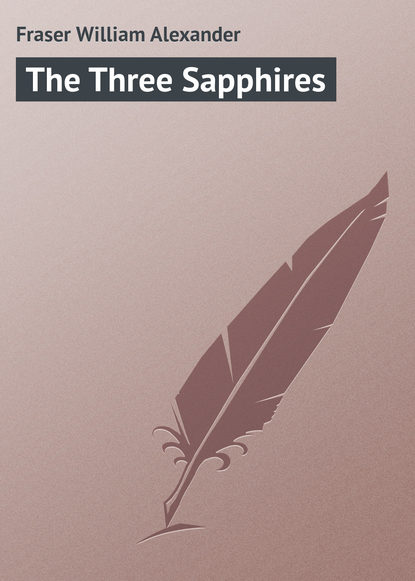По всем вопросам обращайтесь на: info@litportal.ru
(©) 2003-2024.
✖
The Three Sapphires
Автор
Год написания книги
2017
Настройки чтения
Размер шрифта
Высота строк
Поля
Finnerty, peeping into the silver box that had been replaced by the servants on the table, asked: "Any of you chaps got that bell clapper? I left it here."
Nobody had; nobody knew anything about it. Instinctively each one felt his pockets to be sure that, in the excitement of the struggle, he hadn't put it away; then each one remembered that he hadn't seen it since the major deposited it in the silver box.
"The table was upset," Swinton said. "Look on the floor."
Even Prince Ananda joined in the search. Then the servants were questioned. They knew nothing of its whereabouts; all denied that they had seen the keddah sahib put it in the box.
A little constraint crept into the search. Prince Ananda's brother-in-law and the temple priest had been there and had departed; the prince's servants had been going and coming.
"It may have rolled off the terrace into the water," Prince Ananda suggested. "In the morning I'll have the lake searched at this point."
"It doesn't matter," Finnerty declared.
"It does, my dear major," Ananda objected. "I'll put pressure on the servants, for I'm very much afraid one of them has stolen it. At any rate, you've been looted in my house, and if I don't find your sapphire you shall have the finest jewel Hamilton Company can send up from Calcutta."
"My young friend was too enthusiastic," Doctor Boelke said with a mirthless grin; "he has also soaked my legs."
The savage wrestling bout and the mysterious loss of the sapphire brought a depressing vacuity of speech. The guests were soon waiting in the courtyard for the tonga.
Swinton stepped over to where Finnerty waited in his dogcart while a servant lighted the lamps, saying: "Prince Ananda has arranged that we are to call on the maharajah at ten o'clock to-morrow, and I'd like to ride over to see your elephants later on."
"Come for tiffin," the major invited.
As the tonga carrying Lord Victor and Swinton was starting, Ananda said: "I've told the driver to show you the Maha Bodhi Temple and a pagoda on your way; it is there that Prince Sakya Singha attained to the Buddha. Good night."
Halfway down the tonga stopped, and their eyes picked up, off to the right, a ravishing sight. A gloomed hill, rising like a plinth of black marble, held on its top a fairy-lined structure. Like a gossamer web or a proportioned fern, a wooden temple lay against the moonlit sky; beside it, towering high to a slender spire, was the pagoda, its gold-leafed wall softened to burnished silver by the gentling moon. A breeze stirred a thousand bells that hung in a golden umbrella above the spire, and the soft tinkle-tinkle-tinkle of their many tongues was like the song of falling waters on a pebbled bed till hushed by a giant gong that sent its booming notes reverberating across the hills as some temple priest beat with muffled club its bronzed side.
"Devilish serene sort of thing, don't you think?" Lord Victor managed to put his poetic emotions into that much prose banality.
The driver, not understanding the English words, said in Hindustani: "There will be much war there to-morrow when they fight over their gods."
As if his forecast had wakened evil genii of strife up in the hills, the fierce blare of a conch shell, joined in clamour by clanging temple bells, came across the valley, shattering its holy calm.
"My aunt! What a beastly din!" Lord Victor exclaimed.
"War," the driver announced indifferently.
Human voices pitched to the acute scale of contending demons now sat astride the sound waves.
"Gad! Dharama has stolen a march on the mahanta and is sneaking in his Buddha by moonlight," Swinton declared.
The tumult grew in intensity; torches flashed and dimmed in and out about the temple like evil eyes.
"Shall we take a peep, old top?" Lord Victor asked, eagerness in his voice.
Swinton spoke to the driver, asking about the road, and learned that, turning off to the right at that point, it wound down the mountainside and up the other hill to the temple.
Just at that instant there came from down the road the clatter of galloping hoofs and the whirling bang of reckless wheels. In seconds the keddah sahib's dogcart swirled into view; he reined up, throwing his horse almost on his haunches.
"That mongrel Buddhist, Dharama, is up to his deviltry; I've got to stop him!"
He was gone.
At a sharp order from Swinton the tonga followed, the driver, eager to see the fray, carrying them along at perilous speed. At each sharp turn, with its sheer drop of a hundred feet or more on the outside, the tonga swung around, careening to one of its two wheels, the other spinning idly in the air. The little ruby eyes in the back of the dogcart's lamps twinkling ahead seemed to inspire their driver with reckless rivalry.
When they arrived at the temple the battle had reached its climax. The brass Buddha, its yellow face with the sightless eyes of meditation staring up in oblivious quietude to the skies, was lying all alone just within the temple gate. Without, Dharama and his Buddhists battled the smaller force of the mahanta, who led it with fanatical fervour.
They saw the keddah sahib towering above the fighting mob, his spread arms raised as if exhorting them to desist from strife. The combatants broke against his body like stormy waves, his words were drowned by the tumult of the passion cries.
Swinton and Lord Victor dropped from the tonga, and as they ran toward the riot something happened. A native close to Dharama struck at Finnerty with a long fighting staff, the blow falling on an arm the Irishman thrust forward as guard. Like an enraged bull bison, the keddah sahib charged. Dharama and the man who had struck were caught by the throats and their heads knocked together as though they were puppets; then Dharama was twisted about, and the foot of the big Irishman lifted him with a sweeping kick. He catapulted out of the fray. Then the keddah sahib's fists smote here and there, until, discouraged by the fate of their leader and the new re-enforcements – for Lord Victor and Captain Swinton were now busy – the Buddhists broke and fled.
"Faith, it's a busy night, captain!" Finnerty exclaimed as he wiped perspiration from his forehead. He turned to the mahanta, and, pointing to the yellow god, said: "Roll that thing down the hill!"
In a frenzy of delight the temple adherents laid hands upon the brass Buddha. It took their united strength to drag and roll it to the edge of the sloping hillside a hundred feet away. The sahibs stood on the brink, watching the image that glinted in the moonlight as it tumbled grotesquely over and over down the declivity till it plunged into the muddy waters of Gupti Nala.
"There'll be no more trouble over installing that idol in the temple for some time," Finnerty chuckled.
Then they climbed into tonga and dogcart, and sped homeward.
Chapter II
The bungalow Swinton and Lord Victor occupied was in a large, brick-walled compound, in the cantonments, that was known as the Dak Compound, because it contained three bungalows the maharajah maintained for visiting guests.
The tonga, finishing its clattering trip from the Maha Bodhi Temple, swung through the big gate to a circular driveway, bordered by a yellow-and-green mottled wall of crotons, here and there ablaze with the flaming blood-red hibiscus and its scarlet rival, the Shoe flower. Swinton took a deep draft of the perfumed air that drifted lazily from pink-cheeked oleander and jasmine; then he cursed, for a brackish taint of hookah killed in his nostrils the sweet perfume.
To his right lay one of the guest bungalows, and a light, hanging on the veranda, showed a billowy form of large proportions filling an armchair. Somebody must have arrived, for the bungalow had been empty, the captain mentally noted.
In bed, Swinton drifted from a tangle of queries into slumber. Why had the German drawn Finnerty into wrestling the Punjabi? Why had some one stolen the uncut sapphire? What was behind the prince's pose in religion? Who was the woman behind the lattice – yes, it was a woman – Then Swinton drowsed off.
It is soul racking to awaken in a strange room, startled from sleep by unplaceable sounds, to experience that hopeless lostness, to mentally grope for a door or a window in the way of a familiar mark to assist one's location. When Captain Swinton was thrust out of deep slumber by a demoniac tumult he came into consciousness in just such an environment. Lost souls torturing in Hades could not have given expression to more vocal agony than the clamour that rent the night.
Swinton was on his feet before he had mentally arranged his habitat. He groped in the gloom for something of substance in the sea of uncertainty; his hands fell upon the table, and, miraculously, a match box. Then he lighted a lamp, pushed out into the passage, and saw Lord Victor's pajamaed figure coming toward him.
"What a bally row!" the latter complained sleepily. "Must be slaughter!"
Out on the veranda, they located the vocal barrage; it was being fired from the bungalow in which they had seen the bulky figure in white. Perhaps the vociferous one had seen their light, for he was crying: "Oh, my lord and master, save me! Tiger is biting to my death! I am too fearful to explore across the compound. Heroic masters, come with guns!"
"Oh, I say! What a devilish shindy!" Lord Victor contributed petulantly. "Is that bounder pulling our legs?"
"It's a baboo, and a baboo has no sense of humour; he doesn't pull legs," the captain answered. "But he does get badly funked."
Another voice had joined issue. Swinton knew it for a "chee-chee" voice, a half-caste's.
"Yes, sar," the new pleader thrust out across the compound; "we are without firearms, but a prowling tiger is waiting to devour us."
He was interrupted by a bellowing scream from his companion, an agonised cry of fright. As if in lordly reproach, the clamour was drowned by a reverberating growl: "Waugh-h-h!"
"Gad, man! Devilish like a leopard!" And the captain darted into his room to reappear with a magazine rifle. A bearer came running in from the cook-house, a lighted lantern in his hand, at that instant.








